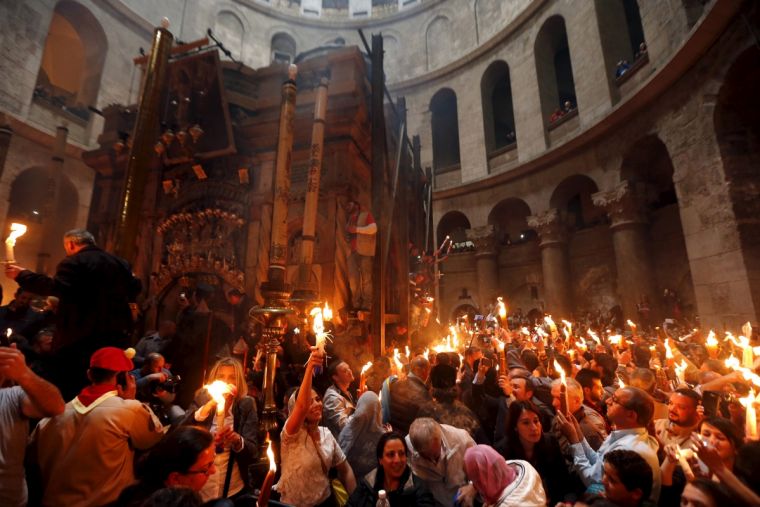Jerusalem's Church of Holy Sepulchre shuts indefinitely amid fierce row with Israel
Jerusalem's famous Church of the Holy Sepulchre has shut indefinitely in an unprecedented move amid a fierce row with the Israeli government.
The church is the holiest site in Christianity and is held to contain the two sites where Jesus was crucified then buried and resurrected.
It is highly unusual for the Greek Orthodox, Armenian and Catholic denominations, who all share custody of the church, to agree to a stance as dramatic as closing the whole site and tensions between denominations often run high over control of its various chapels and compartments.
But the separate leaders issued a joint statement saying the move was 'in protest at persistent moves to intimidate Christians and discriminate against churches in the Holy Land'.

The shock move comes amid a tense fallout with the Israeli government over a bill that would give the Israeli government power to confiscate church property. The 'Bill of Church Lands', sponsored by Israeli settler groups and signed by 40 members of Israel's Knesset, was branded 'discriminatory and racist' as well as 'abhorrent' in the strongly worded statement signed by Theophilos III, Patriarch of Jerusalem, Francesco Patton, Custos of the Holy Land and Nourhan Manougian, Armenian Patriarch of Jerusalem.
It amounts to a 'systematic campaign against the Churches and the Christian community in the Holy Land', the church leaders said in a statement on Sunday.
'This systematic and unprecedented attack against Christians in the Holy Land severely violates the most basic, ab antiquo and sovereign rights, trampling on the delicate fabric of relations between the Christian community and the authorities for decades,' they said.
They also protest against plans to retrospectively tax churches millions of dollars for their lands, previously considered exempt.
The bill set to approved by Israeli ministers would restrict the rights of churches to deal independently with their own land and also threatens church land around the Jaffa gate of the Old City of Jerusalem.
'This systematic and offensive campaign has reached an unprecedented level as the Jerusalem municipality issued scandalous collection notices and orders of seizure of Church assets, properties and bank accounts for alleged debts of punitive municipal taxes,' the statement read.
'A step that is contrary to the historic position of the Churches within the Holy City of Jerusalem and their relationship with the civil authorities. These actions breach existing agreements and international obligations which guarantee the rights and the privileges of the Churches, in what seems as an attempt to weaken the Christian presence in Jerusalem. The greatest victims in this are those impoverished families who will go without food and housing, as well as the children who will be unable to attend school.'
In a sign of how serious churches consider the situation, the most senior Church leader in Jerusalem warned that 'radical settlers' are threatening the ancient, religious 'status quo' in the Holy City by which Christians can live and worship in peace despite the stark political divisions there.
The Greek Orthodox Patriarch of Jerusalem, Theophilos III, wrote an opinion article in the Guardian last month accusing the settlers of an 'aggressive campaign of removing non-Jews from the City and from these strategic centres at the heart of the Christian quarter, threatening the very presence of Christians in the Holy Land'.
The Patriarch toured a number of countries including the UK raising concern about the bill and won the support of international religious leaders including Pope Francis, the UK's Catholic head Cardinal Nichols and the Archbishop of Canterbury, Justin Welby.
Cardinal Nichols said the bill represented 'an intolerable infringement of the status quo and the legitimate rights of the churches, and should be recognised for what it is: an attack on the property rights of the Christian community'.











